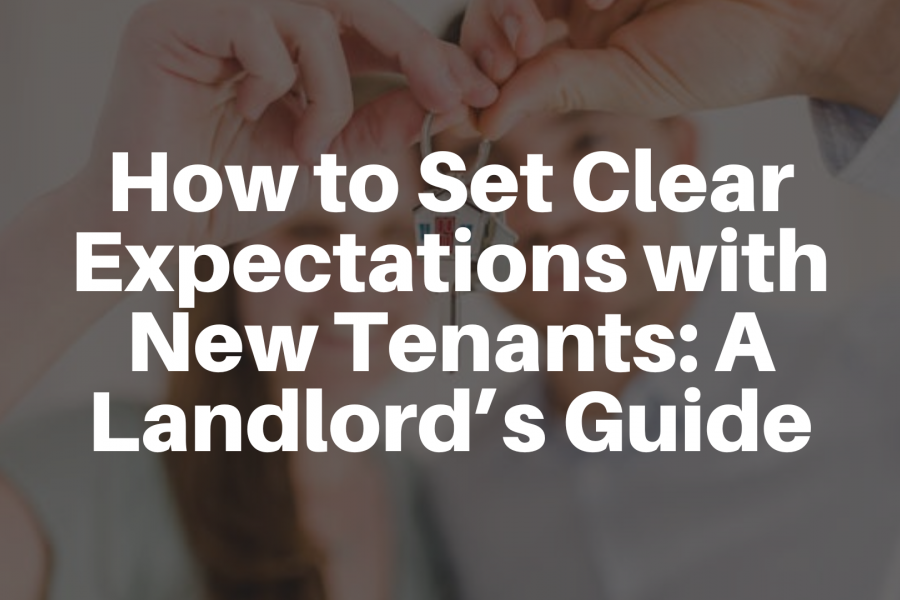How to Set Clear Expectations with New Tenants: A Landlord’s Guide

- Key Takeaways
- Why Setting Expectations Matters
- Start with a Solid Lease Agreement
- Establish Communication Boundaries
- Discuss House Rules and Policies in Person
- Clarify Rent Payment Procedures
- Define What Happens at Move-Out
- Set Standards for Maintenance and Repairs
- Encourage Open Dialogue
- Consider Working with a Property Management Company
Key Takeaways
- Setting clear expectations at the beginning of each tenancy is important for fostering the landlord-tenant relationship.
- Beginning a tenancy with a good relationship leads to reduced turnover and a more successful rental.
- Partnering with a property management company can help foster relationships with tenants and manage your property.
One of the most important responsibilities of a landlord is to foster a strong, respectful relationship with new tenants from the start. A key part of this is setting clear expectations early on. When tenants know what’s expected of them—and what they can expect from you—they’re more likely to take better care of the property, pay rent on time, and communicate effectively. This guide by Evolve Property Management will walk you through setting expectations with tenants and fostering a positive relationship.
Why Setting Expectations Matters
Tenants aren’t mind readers. Even if something seems like “common sense” to you, your tenants may have completely different standards or assumptions based on past rentals. By clearly outlining your expectations, you eliminate confusion and protect both your property and your relationship with your tenants.
If tenants are not told how to report maintenance issues or what the rules are about noise levels, you may face property damage, complaints from neighbors, or emergency calls that could have been resolved earlier. Clear communication leads to fewer lease violations, fewer misunderstandings, and more respectful interactions.

Start with a Solid Lease Agreement
The lease is the foundation of your relationship with your tenant. It’s not just a legal form—it’s a communication tool. A well-written lease should outline not only the financial terms (rent amount, due date, late fees but also important policies around property use, maintenance responsibilities, communication, and procedures for handling problems.
It’s important to walk the tenant through the lease before they sign it. Take time to explain each major section in plain language, and invite questions. Don’t assume they’ll read it on their own. Tenants often skim lease agreements or miss critical details that could cause conflict later on.
Establish Communication Boundaries
Miscommunication is a common source of frustration for both landlords and tenants. Early on, establish how you prefer to be contacted and what types of issues warrant which communication methods.
For instance, you can ask tenants to report non-urgent maintenance via email, but to call or text for emergencies. Clarify your typical response times and availability. Let them know if you observe quiet hours for calls or texts, and be sure to provide alternative contacts if you’re away.
Doing this avoids confusion and sets expectations around responsiveness. Tenants feel more secure knowing how and when to reach you, while you can maintain work-life boundaries.
Discuss House Rules and Policies in Person
While the lease covers the legalities, a tenant welcome guide or move-in checklist can help outline practical day-to-day expectations. This can include things like:
- Where to put trash bins and when pickup occurs
- How to contact you for repairs or emergencies
- Guest and parking policies
- Proper HVAC and appliance use
- Expectations for cleanliness and upkeep

Go over these rules in person or via video call before move-in day. Even better, walk through the property together and point out key features and potential problem areas. This type of personal interaction not only reinforces the rules but also helps you build rapport with your new tenant.
Clarify Rent Payment Procedures
Rent is the lifeblood of your rental business. That’s why it’s crucial to be crystal clear about how much it is, when it’s due, how it should be paid, and what happens if it’s late. Outline your preferred payment method and specify the due date and any applicable grace periods. Go over the consequences of late payments, including late fees and potential eviction steps, if applicable.
Make sure the tenant understands this before move-in. Confirm the details in writing and remind them during the lease signing process. When rent collection is predictable and consistent, it reduces your stress and allows your tenant to plan accordingly.
Define What Happens at Move-Out
It may seem premature to talk about move-out during move-in, but it’s an essential part of managing expectations. Let tenants know how much notice is required before vacating, what condition you expect the property to be returned in, and how the security deposit process works.
Explain your cleaning standards and what constitutes normal wear and tear versus damage. When tenants know what to aim for, they’re more likely to maintain the unit well and avoid losing their deposit unnecessarily.

Set Standards for Maintenance and Repairs
Tenants should know what kind of maintenance is their responsibility and what falls under yours. They should also be informed about how to report maintenance issues and what the expected turnaround time is for different types of repairs.
Encourage your tenants to report problems early to prevent bigger issues. Additionally, clarify the rules around alterations. Can tenants hang pictures, paint walls, or install shelves? If not, be specific. If you allow it with permission, explain the process to request approval.
Encourage Open Dialogue
Creating a space for open and respectful communication encourages tenants to speak up early when problems arise. This can lead to quicker resolutions and a more positive living experience overall.
Let your tenants know you’re approachable and that you value their comfort and safety. Encourage them to raise concerns and ask questions. Being proactive and available fosters trust and makes it easier to manage your property effectively.
Consider Working with a Property Management Company
If you own multiple properties or simply prefer a hands-off approach, working with a professional property management company can be a wise investment. Property managers have systems in place to onboard new tenants efficiently and ensure that expectations are clearly communicated at every stage.
From lease signing to move-in orientations and ongoing support, a property management company can:
- Handle tenant communication professionally
- Provide digital access to leases, payment portals, and maintenance requests
- Enforce rules and policies consistently
- Manage disputes with minimal landlord involvement
- Coordinate maintenance and emergency repairs
- Offer 24/7 support, which increases tenant satisfaction
Conclusion
Setting clear expectations with new tenants is essential to a successful rental experience. It helps prevent misunderstandings, protects your property, and lays the groundwork for a respectful relationship built on trust and accountability.
Follow these simple tips to help you get started. If you want to ensure a smooth process, work with a professional property management company like Evolve Real Estate and Property Management.
